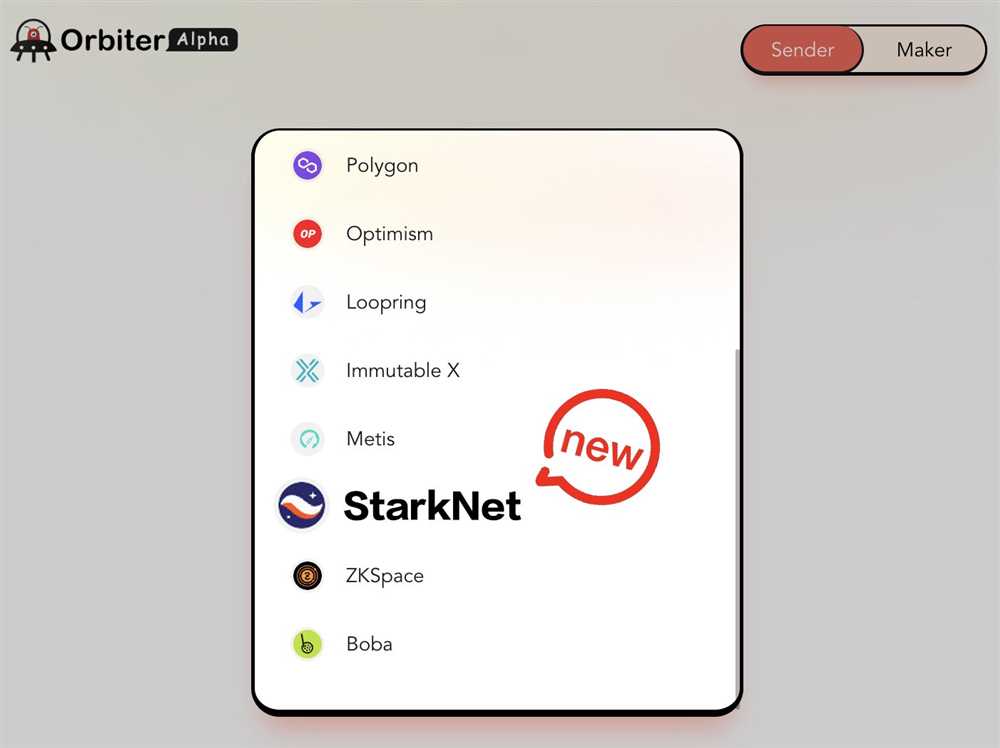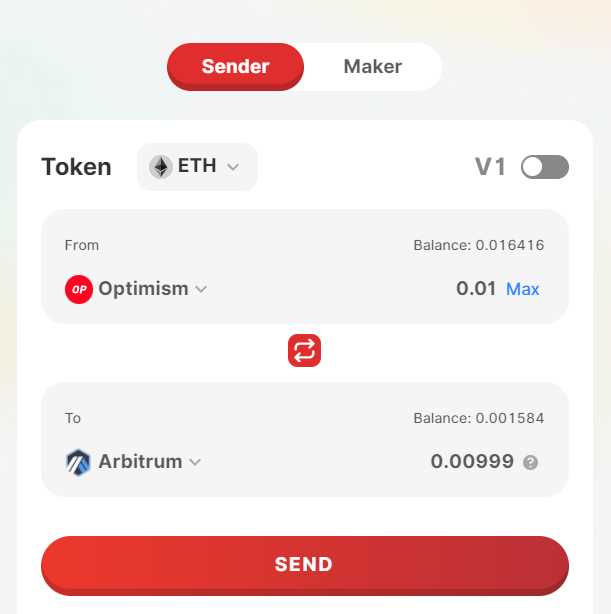
Building a Secure and Transparent Financial Future with Orbiter Finance

Decentralization and distributed governance have emerged as key principles shaping the future of finance. In a world where traditional financial systems have faced significant challenges, Orbiter Finance is paving the way for a new era of secure and transparent financial solutions.
At Orbiter Finance, decentralization is not just a buzzword – it is at the core of their mission. By leveraging the power of blockchain technology, Orbiter Finance is able to eliminate the need for intermediaries, such as banks or financial institutions. This decentralized approach ensures that the financial system is not controlled by a single entity, reducing the risk of corruption and manipulation.
But decentralization alone is not enough. To ensure a truly transparent and fair financial future, Orbiter Finance has implemented distributed governance. This means that decision-making power is spread across a network of participants, rather than being concentrated in the hands of a select few. Through a process of voting and consensus, stakeholders have the ability to shape the future of Orbiter Finance, ensuring that the platform remains true to its values and objectives.
By combining decentralization and distributed governance, Orbiter Finance is able to create a more secure and transparent financial ecosystem. Users can have peace of mind knowing that their assets are protected by the immutable nature of blockchain technology, while also having a say in the direction and development of the platform. This innovative approach has the potential to revolutionize the way we think about and engage with finance, paving the way for a more inclusive and equitable financial future.
Decentralization and Distributed Governance in Finance

In the world of finance, the concepts of decentralization and distributed governance have gained significant attention in recent years. These principles aim to create a financial system that is secure, transparent, and resistant to manipulation.
Decentralization refers to the distribution of power and control across a network, rather than being concentrated in a single entity or authority. This is achieved through the use of blockchain technology, which enables a network of computers (nodes) to collectively maintain and validate the integrity of financial transactions.
Distributed governance is the practice of making decisions and managing operations in a decentralized network. This ensures that no single entity has absolute control over the system, and decisions are made through consensus among network participants.
One example of a project that embraces decentralization and distributed governance is Orbiter Finance. It is a decentralized finance (DeFi) platform built on the Ethereum blockchain. Orbiter Finance utilizes smart contracts to enable peer-to-peer lending and borrowing, as well as liquidity provisioning.
Benefits of Decentralization and Distributed Governance

The adoption of decentralization and distributed governance in finance offers several key benefits:
- Security: By distributing control across a network, the risk of a single point of failure or malicious attack is significantly reduced. This makes it more difficult for bad actors to manipulate or compromise the system.
- Transparency: With decentralized finance, all transactions are recorded on a public blockchain, providing transparency and visibility for all participants. This eliminates the need for intermediaries and enhances trust among users.
- Resilience: Decentralized finance systems are inherently more resilient as they do not rely on a single central authority. If one node goes offline or is compromised, the network can continue to operate without disruption.
In conclusion, the concepts of decentralization and distributed governance are revolutionizing the financial industry by creating a more secure, transparent, and resilient system. Orbiter Finance is just one example of how these principles can be implemented in practice, paving the way for a decentralized financial future.
Orbiter Finance: Championing a Secure and Transparent Future

Orbiter Finance is at the forefront of revolutionizing the financial landscape with its commitment to security and transparency. By harnessing the power of decentralization and distributed governance, Orbiter Finance is paving the way for a more secure and transparent financial future.
Decentralization: Redefining Financial Systems
Decentralization lies at the heart of Orbiter Finance’s philosophy. By removing the need for a central authority, Orbiter Finance ensures that no single entity has control over the entire financial ecosystem. This decentralized approach empowers individuals, giving them the ability to have a stake in the decision-making process.
Through the use of blockchain technology, Orbiter Finance fosters an environment of trust and openness. Transactions are securely recorded on the blockchain, ensuring transparency and immutability. Each transaction is visible and traceable, allowing for a level of accountability never seen before in traditional financial systems.
Distributed Governance: Empowering the Community

Orbiter Finance believes in the power of distributed governance. Through its decentralized governance model, Orbiter Finance ensures that important decisions are made collectively, with the involvement of its community members. This inclusive approach allows for a diversity of perspectives and ensures that decisions are made in the best interest of the entire community.
By allowing community members to actively participate in the governance process, Orbiter Finance is able to foster a sense of ownership and accountability. Community members have the power to propose and vote on changes, ensuring that the platform evolves in a way that aligns with the community’s needs and values.
Building a Secure and Transparent Financial Future
Through its commitment to decentralization and distributed governance, Orbiter Finance is championing a future that is both secure and transparent. By removing the reliance on centralized authorities and empowering the community, Orbiter Finance is paving the way for a financial ecosystem where trust and accountability are paramount.
The use of blockchain technology ensures that transactions are securely recorded and transparent, revolutionizing the way financial systems operate. By giving individuals the ability to actively participate in the decision-making process, Orbiter Finance allows for a more inclusive and equitable financial future.
Join Orbiter Finance on its mission to create a secure and transparent financial future – a future where individuals have control over their own financial destinies.
The Advantages of Decentralization in Financial Systems

Decentralization is revolutionizing the way financial systems operate, offering numerous advantages compared to centralized models. By distributing power and decision-making across multiple participants, decentralization provides a more secure, transparent, and efficient framework for managing financial transactions. Here are some key advantages of decentralization in financial systems:
| Advantage | Description |
|---|---|
| 1. Enhanced Security | Decentralized financial systems are less vulnerable to hacking and fraud compared to centralized systems. Rather than relying on a single point of failure, decentralization distributes data and processing power across a network, making it extremely difficult for malicious actors to compromise the entire system. |
| 2. Increased Transparency | Decentralized financial systems utilize blockchain technology, which provides a transparent and immutable record of all transactions. This transparency reduces the risk of fraud and enables participants to verify the accuracy and authenticity of financial data. |
| 3. Improved Efficiency | Through the elimination of intermediaries and the use of smart contracts, decentralized financial systems streamline processes and reduce costs. Transactions can be completed faster and with lower fees, resulting in increased efficiency and improved access to financial services for individuals and businesses. |
| 4. Empowered Individuals | Decentralization empowers individuals by giving them control over their own financial assets. With decentralized financial systems, individuals can manage their funds directly, without the need for intermediaries such as banks or third-party service providers. |
| 5. Resilience and Stability | Decentralized financial systems are inherently more resilient and stable compared to centralized systems. In the event of a network or server failure, the system can continue to function as long as a sufficient number of nodes are still operational. This redundancy ensures that financial services can remain uninterrupted even in the face of technical issues. |
Overall, decentralization offers a robust and forward-thinking approach to financial systems, providing benefits in terms of security, transparency, efficiency, empowerment, and resilience. As the adoption of decentralized technologies continues to grow, we can expect to see even greater advancements in the way financial transactions are conducted.
The Power of Distributed Governance in Orbiter Finance

Orbiter Finance is a revolutionary platform that harnesses the power of decentralization and distributed governance to create a secure and transparent financial future. Through its innovative technology and unique approach to governance, Orbiter Finance is changing the way financial systems operate.
One of the key advantages of distributed governance is its ability to ensure that no single entity or individual has control over the platform. This means that decisions are made collectively by the community, with each participant having a say in the governance process. This democratic approach prevents power imbalances and promotes fair decision-making.
The distributed governance model also enhances security and transparency. With multiple stakeholders involved in the decision-making process, there is a higher level of scrutiny and accountability. This makes it difficult for any malicious actor to manipulate the system or engage in fraudulent activities. The transparency aspect ensures that all governance decisions and transactions are publicly available, allowing for a greater level of trust and confidence in the platform.
Orbiter Finance employs a combination of blockchain technology and smart contracts to facilitate the distributed governance process. The blockchain acts as a decentralized ledger, recording all transactions and governance decisions in a tamper-proof manner. Smart contracts, on the other hand, are self-executing contracts that automatically enforce the agreed-upon rules and conditions. This eliminates the need for intermediaries and ensures that governance processes are carried out efficiently and accurately.
The power of distributed governance lies in its ability to foster a sense of ownership and community engagement. Participants are incentivized to actively participate in the governance process through token rewards and voting rights. This not only strengthens the platform’s security and robustness but also promotes community growth and development.
| Benefits of Distributed Governance in Orbiter Finance |
| • Democratic decision-making process |
| • Enhanced security and transparency |
| • Utilization of blockchain technology and smart contracts |
| • Community ownership and engagement |
Overall, distributed governance plays a crucial role in Orbiter Finance, shaping a secure and transparent financial future. By empowering the community and leveraging advanced technologies, Orbiter Finance is paving the way for a new era of decentralized finance.
Q&A:
What is Orbiter Finance?
Orbiter Finance is a decentralized finance platform that utilizes blockchain technology to provide secure and transparent financial services. It aims to empower individuals by removing intermediaries and allowing for peer-to-peer transactions.
How does Orbiter Finance ensure security in its platform?
Orbiter Finance ensures security through the use of blockchain technology, which provides immutability and transparency to transactions. Additionally, it leverages cryptography and smart contracts to protect user data and assets.
What is distributed governance and how does Orbiter Finance use it?
Distributed governance refers to the process of making decisions in a decentralized manner, where multiple participants have a say in the decision-making process. Orbiter Finance uses distributed governance by allowing token holders to vote and participate in important decisions, ensuring a transparent and community-driven platform.
What are the advantages of using a decentralized finance platform like Orbiter Finance?
Using a decentralized finance platform like Orbiter Finance offers several advantages. First, it eliminates the need for intermediaries, reducing costs and increasing efficiency. Second, it provides greater security and transparency through the use of blockchain technology. Lastly, it allows for greater financial inclusion, as anyone with an internet connection can access these services.
How can I get involved with Orbiter Finance’s community and governance?
To get involved with Orbiter Finance’s community and governance, you can become a token holder and participate in voting and decision-making processes. Additionally, you can join their online communities and forums to engage with like-minded individuals and stay updated on the latest developments and initiatives.


